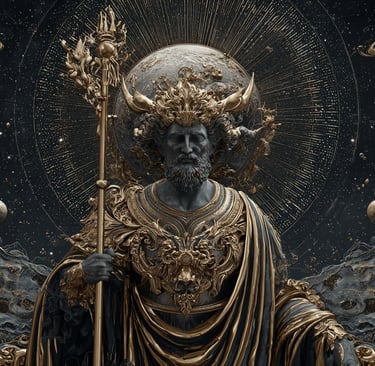Jupiter: King of the Gods
Jupiter stands as the supreme deity of the Roman pantheon, the divine sovereign whose authority mirrors and legitimizes earthly power. More than simply the Roman version of Greek Zeus, Jupiter embodied distinctly Roman concepts of cosmic order, political authority, and moral justice that made him the perfect patron for a civilization destined to rule the world.
Origins and Etymology
The name Jupiter derives from the ancient Indo-European sky god Dyēus ph₂tḗr (literally "Sky Father"), connecting him to Zeus Pater in Greek, Dyaus Pita in Sanskrit, and similar divine figures across Indo-European cultures. This linguistic connection reveals Jupiter's ancient origins as a sky deity whose authority was recognized across vast stretches of prehistoric Europe and Asia.
In earliest Roman tradition, Jupiter appeared as Iuppiter Optimus Maximus - "Jupiter Best and Greatest" - a title that emphasized his supreme excellence rather than mere power. The epithet "Optimus" (best) suggested moral perfection, while "Maximus" (greatest) indicated his unmatched authority over gods and mortals alike.
Archaeological evidence suggests that Jupiter worship on the Capitoline Hill dates to Rome's earliest period, possibly to the 6th century BCE. The great Temple of Jupiter Optimus Maximus, traditionally attributed to the Etruscan king Tarquinius Superbus, became the religious center of Roman state worship and remained so for nearly a thousand years.
Divine Attributes and Symbols
Jupiter's iconography reflected his cosmic authority and role as divine king. His primary symbols carried both religious and political significance that resonated throughout Roman culture.
The thunderbolt (fulmen) served as Jupiter's characteristic weapon and symbol of divine judgment. Unlike the capricious lightning of natural storms, Jupiter's thunderbolt represented deliberate divine intervention in human affairs. Romans carefully interpreted lightning strikes as divine messages, with elaborate procedures for propitiating Jupiter when his bolts struck public buildings or sacred spaces.
The eagle became Jupiter's sacred bird and the emblem of Roman military power. Roman legions carried eagle standards (aquilae) into battle as symbols of Jupiter's protection and divine approval for Roman conquest. The connection between Jupiter's eagle and Roman military success reinforced the belief that Rome fought with divine sanction.
The oak tree symbolized Jupiter's enduring strength and natural authority. Sacred oak groves served as sites for outdoor religious ceremonies, and oak wreaths became symbols of civic honor. The association between Jupiter and oaks appears throughout Indo-European tradition, suggesting this connection preserved extremely ancient religious concepts.
The scepter represented Jupiter's kingly authority over both divine and mortal realms. Roman magistrates carried ceremonial staves that symbolically connected their authority to Jupiter's cosmic kingship, reinforcing the divine foundation of Roman political power.
Theological Concepts and Divine Functions
Jupiter's role in Roman religion extended far beyond weather control to encompass fundamental concepts of cosmic order, justice, and divine kingship that shaped Roman political and social thinking.
Cosmic Sovereignty
As rex deorum (king of the gods), Jupiter maintained cosmic order through his supreme authority over divine hierarchy. This divine kingship provided the model for earthly political authority, with Roman emperors claiming to rule as Jupiter's earthly representatives. The concept of divine monarchy influenced Roman political development and provided religious justification for imperial expansion.
Jupiter's cosmic authority extended to the division of the universe among his brothers Neptune (sea) and Pluto (underworld). This divine territorial arrangement provided precedent for Roman territorial organization and administrative division of conquered lands.
Divine Justice and Law
Jupiter served as guardian of oaths and treaties, making him essential to Roman diplomatic and legal practices. All significant political agreements were made under Jupiter's protection, with oath-breaking considered a direct offense against divine authority that would inevitably bring divine punishment.
The concept of Jupiter's justice (Iustitia Iovis) influenced Roman legal development. Romans believed that human law should reflect divine justice, with Jupiter serving as the ultimate judge whose decisions provided models for earthly courts. This theological foundation gave Roman law its claim to universal validity.
Divine retribution remained Jupiter's responsibility, though Romans believed he often delayed punishment to allow for repentance or to ensure appropriate justice. This concept of delayed but inevitable divine justice influenced Roman attitudes toward crime, punishment, and moral behavior.
Protection of the State
Jupiter's role as protector of Rome made him the primary divine guardian of Roman political interests. Major military campaigns began with sacrifices to Jupiter, seeking his approval and protection for Roman forces. Military victories were attributed to Jupiter's favor, while defeats indicated divine displeasure requiring religious remediation.
The Capitoline Triad (Jupiter, Juno, and Minerva) represented the divine protection of Roman state interests. This grouping, housed in Rome's most important temple, symbolized the unity of divine authority (Jupiter), social order (Juno), and practical wisdom (Minerva) that Romans believed essential for successful governance.
Mythology and Sacred Stories
Roman Jupiter mythology emphasized duty, justice, and cosmic order rather than the personal adventures and romantic escapades prominent in Greek Zeus stories. While Romans knew Greek mythological narratives, they preferred stories that supported Roman values and political ideology.
The Struggle for Divine Authority
Roman versions of Jupiter's rise to power emphasized legitimate succession and just governance rather than violent rebellion. Jupiter's victory over the Titans represented the triumph of civilization over chaos, law over lawlessness, and reason over brute force. These themes resonated with Roman beliefs about their civilizing mission in the world.
The division of cosmic authority among Jupiter and his brothers provided a model for Roman administrative organization. Just as the divine brothers governed their respective spheres in harmony, Roman administrators were expected to cooperate in governing their assigned territories for the common good.
Jupiter and Roman History
Romans developed distinctive mythological connections between Jupiter and their national history. The god's special relationship with Rome was demonstrated through miraculous interventions at crucial historical moments.
The Gallic siege of Rome (390 BCE) included stories of Jupiter's direct intervention to save the city. When Gallic warriors attempted to climb the Capitoline Hill to reach Jupiter's temple, sacred geese warned Roman defenders, allowing them to repel the attack. This story reinforced belief in Jupiter's special protection of Rome.
Military victories were routinely attributed to Jupiter's favor, with successful generals offering thanksgiving sacrifices at his Capitoline temple. The practice of triumph processions ending at Jupiter's temple symbolically acknowledged divine authority behind Roman military success.
Religious Practices and Worship
Jupiter worship combined ancient ritual traditions with evolving ceremonial practices that reflected Rome's growing political sophistication and territorial expansion.
Temple Worship and Sacrifice
The Temple of Jupiter Optimus Maximus on the Capitoline Hill served as the center of Roman state religion. This massive structure, repeatedly rebuilt and expanded, housed the cult statue of Jupiter along with images of Juno and Minerva. The temple's central location and impressive architecture symbolized Jupiter's supreme authority over Roman religious life.
Sacrificial practices for Jupiter followed elaborate protocols that emphasized the god's supreme status. White bulls were the preferred sacrificial victims, with the sacrifice performed by the highest-ranking religious officials. The complexity of Jupiterian sacrifice reflected both the god's importance and Roman obsession with ritual precision.
The Ides of each month were sacred to Jupiter, marking them as times for special religious observances and public business. This monthly celebration reinforced Jupiter's role in organizing time and maintaining cosmic order.
Festivals and Public Celebrations
The Ludi Romani (Roman Games), held annually in September, honored Jupiter with theatrical performances, chariot races, and public feasts. These celebrations combined religious devotion with popular entertainment, creating community experiences that reinforced shared religious and political values.
The Ludi Plebeii (Plebeian Games) in November provided another major festival honoring Jupiter, demonstrating his appeal across social classes rather than just among elites. The democratic aspect of Jupiter worship reflected Roman political development and social integration.
Triumph processions culminated at Jupiter's Capitoline temple, where victorious generals offered spoils of war and thanksgiving sacrifices. These ceremonies connected military success with religious devotion while demonstrating Jupiter's role in Roman imperial expansion.
Priestly Offices and Religious Authority
The Flamen Dialis served as Jupiter's special priest, bound by elaborate ritual restrictions that emphasized the god's sacred character. This priest could not leave Rome, touch iron, or perform many ordinary activities, symbolically dedicating his entire existence to Jupiter's service.
The pontifex maximus held ultimate authority over Jupiter's worship along with all other Roman religious practices. This office, eventually held by Roman emperors, connected political leadership with religious authority in ways that reinforced divine sanction for government power.
Jupiter in Roman Art and Culture
Artistic representations of Jupiter evolved alongside Roman political and cultural development, reflecting changing concepts of divine kingship and imperial authority.
Sculptural Traditions
Classical Jupiter appeared as a mature, bearded figure seated on a throne, holding a thunderbolt and scepter. This iconography emphasized divine dignity, paternal authority, and cosmic kingship. Roman artists developed distinctive artistic conventions that differentiated Jupiter from Greek Zeus representations.
Imperial associations led to artistic programs that connected emperors with Jupiterian iconography. Emperors appeared with Jupiter's attributes or in scenes depicting divine approval of imperial authority. These artistic representations reinforced political theology while maintaining religious traditions.
Literary Representations
Virgil's Aeneid presents Jupiter as the divine authority who decrees Roman destiny and oversees the fulfillment of imperial mission. Virgil's Jupiter acts with deliberate purpose and moral authority rather than the emotional volatility sometimes attributed to Greek Zeus.
Ovid's Metamorphoses includes numerous stories featuring Jupiter, though often emphasizing transformation themes rather than political authority. Ovid's treatment shows how Roman writers adapted Greek mythological narratives while maintaining distinctly Roman theological concepts.
Political and Social Significance
Jupiter's role in Roman religion extended far beyond ceremonial worship to encompass fundamental aspects of Roman political ideology and social organization.
Divine Kingship and Imperial Authority
The concept of Jupiter's earthly representative provided religious foundation for Roman imperial authority. Emperors claimed to rule with Jupiter's approval and protection, making resistance to imperial authority equivalent to rebellion against divine order.
Capitoline Jupiter served as witness to imperial ceremonies, oath-taking, and diplomatic agreements. The god's Capitoline temple provided the sacred space where earthly authority connected with divine sanction.
Social Order and Moral Authority
Jupiter's role as guardian of justice influenced Roman legal and moral thinking. Social hierarchies were understood as reflecting divine order, with Jupiter's authority providing the model for legitimate earthly authority relationships.
Oath-taking under Jupiter's protection bound Roman citizens, soldiers, and officials to their duties and obligations. The religious significance of these oaths reinforced social cohesion and political stability.
Legacy and Influence
Jupiter's influence extended far beyond ancient Rome to shape Western concepts of divine authority, political legitimacy, and cosmic order. Medieval and Renaissance European monarchs claimed divine sanction for their authority using concepts derived from Roman Jupiterian theology.
The separation of powers concept in modern democratic government reflects, in part, Roman ideas about divine authority balanced among different functions and institutions. Jupiter's role as supreme but not arbitrary authority influenced political theories that shaped modern constitutional government.
Jupiter remains recognizable in contemporary culture through astronomical naming (the planet Jupiter), literary references, and artistic representations that preserve memory of Rome's supreme deity. Understanding Jupiter provides insight into Roman values, political concepts, and religious thinking that continues to influence Western civilization.


480-366-3550 (Domain Sales)
© SDBEST LLC, 2025. All rights reserved.
Sponsorship Disclosure
Terms of Service
